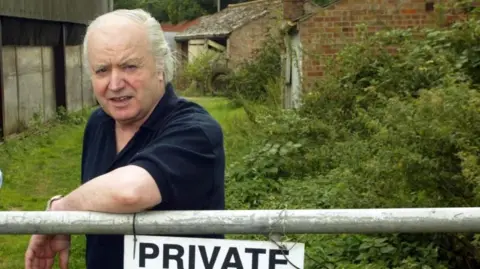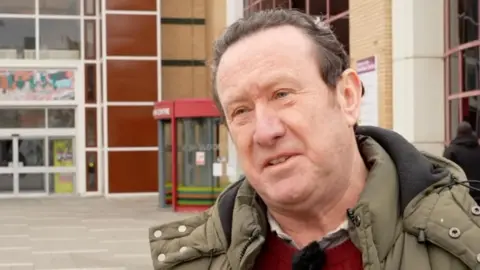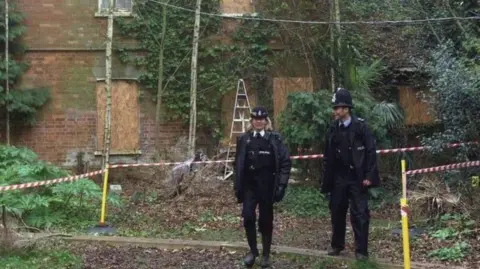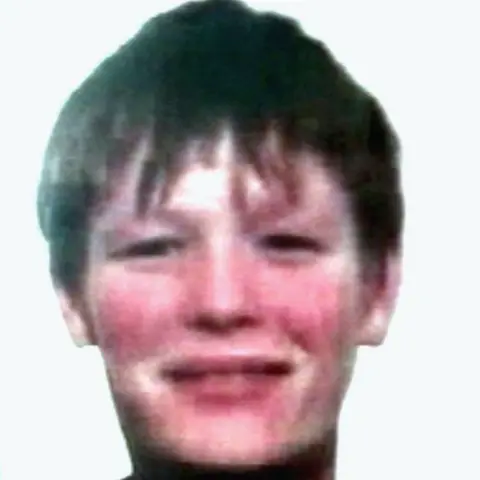Martin never remorseful for shooting, says reporter
 PA Media
PA MediaA journalist who spent two weeks living with Tony Martin said he never heard any indication the farmer was remorseful about shooting dead a teenage burglar.
Martin, who died on Sunday aged 80, was jailed for killing 16-year-old Fred Barras and wounding his accomplice, Brendon Fearon, 29, at his Fenland home in 1999.
Aidan McGurran worked for the Daily Mirror, which signed an exclusive interview deal with Martin that resulted in the pair living together for a time once he had left prison.
He said: "I never once heard Tony Martin in all the interviews I conducted with him ever, ever express any remorse."
 Qays Najm/BBC
Qays Najm/BBCThe pair had broken into Martin's home at Emneth Hungate on the Norfolk-Cambridgeshire border on 20 August 1999 when the shooting occurred.
At his trial, Martin claimed to have been acting in self-defence while prosecutors argued he had anticipated the pair and lay in wait for them.
Sentenced in 2000 for murder, an appeal reduced Martin's conviction to manslaughter on grounds of diminished responsibility, after a diagnosis of paranoid personality disorder.
He was released in 2003 and his case was one of those that led to the law on self-defence being changed.
Mr McGurran told the BBC he covered the story of the break-in and the aftermath, including the trial "which was very big news at the time".
"Subsequently after a lot of negotiations with my boss Eugene Duffy, we ended up doing what we call in the trade a 'buy-up' with Tony Martin, so we did a series of exclusive interviews once he was released from prison," he said.
"We secreted him away from the rest of the rival media... and we kept him under wraps for two weeks.
"The first week was non-stop interviewing; the first day about 11 pages and seven-a-day for the rest of the week.
"The second week was rather easier, because we were just keeping him away from the other media then; we had more downtime and a more enjoyable time."
During that fortnight, Mr McGurran said he and Martin spoke at length about the killing. He described Martin as "not the easiest person to live with".
"I remember, ironically - he'd been out of prison a little while... telling us how much he was looking forward to having a bath.
"About three or four days later we were still reminding him that, 'Actually, Tony, it would be a really good idea if you had that bath now.'"
 PA Media
PA MediaNews of Tony Martin's arrest on suspicion of murdering and wounding intruders on his own property split the "majority" of the public from the police and Crown Prosecution Service (CPS), Mr McGurran said.
"His version of events was he was the innocent victim of a burglary and he came down and defended himself.
"What I always found fascinating was at the end of the day, a 16-year-old died. Now it may have been a 16-year-old who made some bad choices in life, but it's a 16-year-old who theoretically could have turned their life around.
"I think he did feel hard done-by, because if you remember, initially he was convicted of murder. Eventually that was downgraded to manslaughter, so he got out much quicker than he would have done.
"He felt, and to be fair a lot of other people felt, it was self-defence, because it was his own property and he shouldn't have been jailed.
"He felt extremely strongly about that. He felt strongly on quite a few things, but definitely on the rights to self-defence."
 Shutterstock
ShutterstockThe Mirror's decision to pay for the exclusive interview was something Mr McGurran, now a Labour member of Essex County Council and Basildon Council, thought unwise at the time.
He said: "I have to admit, at the time my boss Eugene Duffy was trying to arrange to do the deal with Tony Martin, I wasn't sure it was right for the Daily Mirror given what he'd done.
"To be fair, Eugene was entirely right, I was wrong - The Mirror readers loved it and on the whole were completely behind him.
"At the time, the vast majority of the public felt he shouldn't have been jailed and that he had the right to defend himself however he chose on his own property, rightly or wrongly.
"In terms of public opinion, they were very much behind Tony Martin.
"I'm struggling to think of prosecutions subsequently, so I think the police and CPS now would be much more reluctant to go for a prosecution. It would have to be a very strong case indeed."
 Chris McAndrew
Chris McAndrewSir Henry Bellingham, who was MP for North West Norfolk from 1983 to 1997 and 2001 to 2019, had known Tony Martin since the early 1980s and visited him in prison.
"I have very happy memories of Tony Martin as a young farmer in his late 30s when I first became an MP in the early '80s, and he was a dynamic, interesting guy," he said.
"But he became increasingly eccentric and I think paranoid and obsessive about lack of police response and convinced he was going to get burgled and injured, so this had been building up for a long time.
"But I think the important point to remember is that the law has been subsequently changed.
"The problem with the previous law was an objective test of what would a reasonable person have done in those circumstances.
"Of course you can't sit in an armchair and put yourself in the position of a householder who, in Tony Martin's case, was completely terrified, had been threatened before, had reported numerous incidents to the police and felt he was getting no response; so the test now is subjective.
"What would someone in that case, his case, have done in the circumstances and was that reasonable?
"I would certainly suggest that had the new law, which I helped to frame, been in place when the original offence took place, he wouldn't have been charged and certainly wouldn't have been convicted."
Follow Norfolk news on BBC Sounds, Facebook, Instagram and X.
